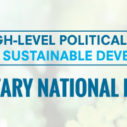
Search
Ibero-America recognises the importance of the Multidimensional Poverty Index as a key tool to strengthen governance

7 May 2021 – Days after the approval of the Andorran Declaration by the Ibero-American Heads of State and Government, and in the backdrop of the XXVII Ibero-American Summit, the Multidimensional Poverty Peer Network (MPPN) celebrated a regional event which discussed the Multidimensional Poverty Index (MPI) as a tool for governance in the region.
The event was co-hosted by the Oxford Poverty & Human Development Initiative (OPHI), as the Secretariat of the MPPN, together with the Ibero-American General Secretariat (SEGIB) and the United Nations Development Programme (UNDP).
In Article 14 of the Declaration, the Ibero-American Heads of State and Government
“Recognized the importance of the Multidimensional Poverty Index (MPI), developed by the United Nations Development Programme (UNDP) and the University of Oxford, as a tool to guide public policies aimed at reducing poverty in all its forms and dimensions, taking into account the need to identify the differentiated impacts produced by the pandemic and the difficulty of measuring them only with instruments based on income level, which do not take into account the multiple deprivations faced by people living in poverty.”
During the event, Rebeca Grynspan, SEGIB’s Secretary General, Luis Felipe López-Calva, UNDP’s Director General for Latin America and the Caribbean, and Sabina Alkire, Director of OPHI, celebrated the content of Article 14 of the Declaration and analysed its implications for public policies.
Next, H.E. María Inés Castillo, Minister of Social Development of Panama and Ivan Ojeda, National Director of Paraguay’s National Statistics Institute, shared their reflections on the challenges involved in moving from multidimensional poverty measurement to the implementation of integrated policies that favour the strengthening of governance within the countries of the region.
Rebeca Grynspan, who led the organization of the XXVII Ibero-American Summit from SEGIB, affirmed that ‘we can only eliminate poverty in all its dimensions in Latin America if we make it visible. First, we have to move from not measuring to measuring, and then from measuring to using this information to drive policy decisions.’
For his part, Luis Felipe López-Calva added that the MPI ‘beyond being an official statistic closely aligned with Sustainable Development Goal 1, is an instrument for improving governance, as it improves the coordination of public policies and the definition of priorities between sectors, favoring accountability and transparency.’
As of 2009, Latin America became the pioneer region for adopting the MPI at a national and subnational level. The 2010 publication of the Global MPI in the UNDP Human Development Report, together with OPHI, promoted the importance of multidimensional poverty measurement globally.
However, guaranteeing its use as a public policy tool is more urgent than ever in the face of the multidimensional effects of the pandemic. ‘To support the countries in this process, OPHI will soon be offering an Executive Education programme aimed at strengthening political leadership and developing the necessary skills to lead strategies for the reduction of poverty in all its forms and dimensions,’ said Sabina Alkire, recognizing in turn the outstanding role played by the General Secretary of SEGIB in the construction of economic, social and environmental proposals for the post-COVID recovery of the region.
The event, facilitated by Michelle Muschett, OPHI’s Director of Strategy and Public Policy, and Gonzalo Hernández-Licona, Director of the MPPN, concluded with the recognition of the importance of the MPPN as a South-South support platform for public policymakers in the region committed to the use of the MPI to reduce poverty in all its forms and dimensions, and thus come closer to achieving the Sustainable Development Goals (SDG) that make up the 2030 Agenda.
More information: contact maya.evans@qeh.ox.ac.uk
















